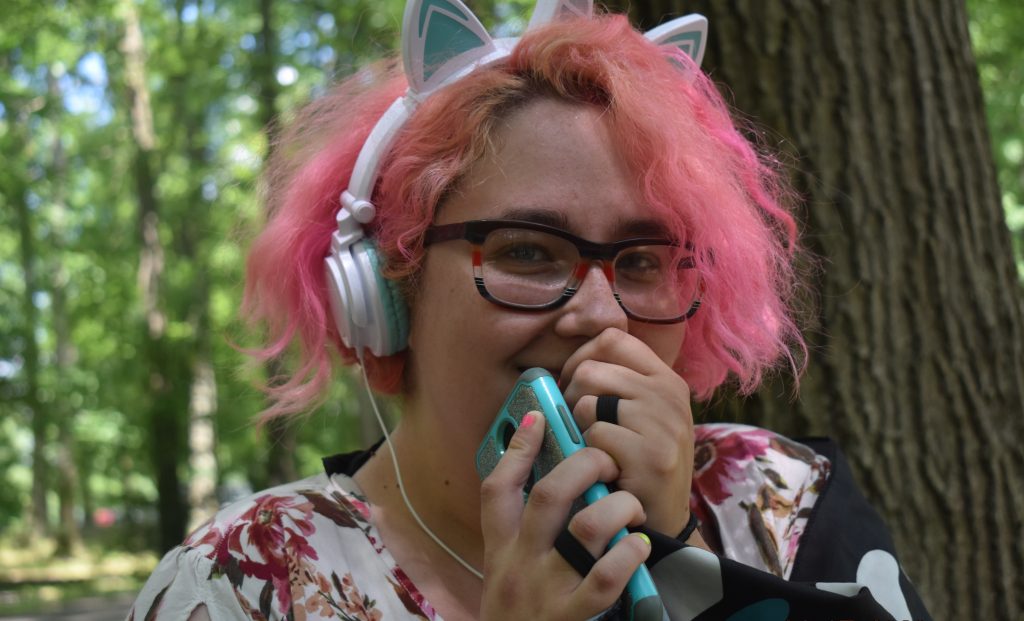
Nera Birch is a self-advocate from Cleveland, OH with a passion for speaking and writing on topics related to autism advocacy. Birch blogs at I’m Not Drunk, I’m Autistic. This week Birch shared her experiences living with auditory processing disorder and how that can impact holiday gatherings.
Can you tell me a little bit about yourself? Are you in school now? Working? What does a day in the life of Nera look like?
I’m 26 years old, and I live in Cleveland, OH. I’ve been speaking and writing about my autistic experiences for 8 years. I just quit my job at an autism resource agency, due to autistic burnout, so right now I’m focusing on my advocacy work. In addition to my blog and The Mighty, I speak at autism conferences and trainings for doctors and first responders. My usual day involves me writing a piece for my blog or The Mighty. I also love to cook and bake, so I try to do that every day. Right now, I’m trying to stave off more burnout, so I’m trying to do things that nourish my soul. I also love knitting and taking walks to see my favorite trees, so I also do a lot of that.
Can you tell me how you came up with the name for your website, the autisticpinup or the subtitle of your blog The Sagas of an Autistic Pinup?
I chose the Autistic Pinup for my name because I have always loved dressing in vintage pinup styles and consider myself a pinup of sorts, so I thought the two meshed well.
What are you most passionate about?
I am most passionate about educating neurotypicals on what it is like to be autistic. I want to get neurotypicals to meet us halfway in adapting and accommodating us. I also like touching on subjects like sex and relationships, because that is often something people assume autistic people aren’t interested in.
You’ve written about your history with abusive therapy (and how you weren’t aware of how traumatizing it was at the time), but maintain that “Even through all of this, I think therapy is one of the greatest tools we have.” How can parents (or individuals) know whether or not they are working with a good therapist?
I am still in the process of trying to find a new therapist. Covid slowed that search down. My advice based on what I am going through right now is to treat therapy like an audition and you are the director. You need to find a person who works for you, and it’s ok to try out several different people to find the one you are most comfortable with.
In a recent blog post, you mentioned how your auditory processing issues make face-to-face verbal conversations difficult. Do you find these difficulties are compounded during the holiday season when emphasis is often placed on social gatherings?
I have always hated holiday gatherings and the auditory processing is a huge part of that. I also hate chit chat and small talk and that seems to be the bulk of the conversation. I always have a book with me, so I can just sit in the corner and read. I also always have headphones with me, so those are usually on with what I call my armor playlist, which consists of mostly 80’s and 90’s ska punk.
Describe environments where you don’t experience auditory processing difficulties. In other words, how can the environment around you change to better meet your needs and remove that disability?
I honestly don’t think there is anything the environment can do to change. I can’t just point at people and tell them to talk one at a time. But the way people react to my sensory issues and adaptations can definitely change. Please don’t think I’m rude if I walk away in the middle of a conversation to put on my headphones. Know that it has nothing to do with you. In fact, it means I feel comfortable enough not to mask in front of you.
Do you have advice for others who have similar auditory processing issues during the holidays specifically?
My advice is to try not to care what people think of you, and I know that it’s hard. But if bringing a book or a stuffed animal to an event comforts you, do it. If you have to take social breaks and run outside and stim for a bit, do it. Don’t be afraid to do whatever you have to to make the situation a little better for yourself, even if it looks weird. Trust me. A meltdown looks a lot worse than me flapping during a conversation.
What mistakes do you see well-intentioned NT advocates make?
I think the biggest mistake people make is to not remember that autistics are our own best experts. One of my favorite presentations I ever wrote is about sensory issues. I was sitting in a conference proposal meeting listening to NTs bemoaning the fact that there are no sensory experts, such as a doctor or psychologist out there. I raised my hand and said I could whip up a little something, considering I live the sensory experiences every day. It just never occurred to them to that I was somewhat of an expert.

Kim